Versions
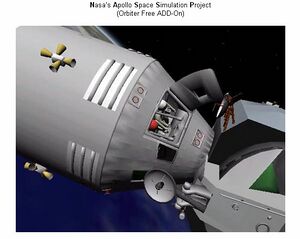
Project Apollo - NASSP was originally called NASSP (Nasa’s Apollo Space Simulation Project) and was based on Alain Capt's AMSO. NASSP was developed by Jean-Luc Rocca-Serra, who released the source code to version 4.x. Mark Grant then rewrote the code as C++, added an initial C++ implementation of the Apollo Guidance Computer and replaced the control panel bitmaps with new ones from P64, releasing 'NASSP COSTAM' and a derivative which provided basic support for the Virtual AGC software. Jean-Luc released NASSP 5.0, an updated version based on that source code, for the next release of Orbiter, including, for example, new particle exhaust support and a Skylab launch module. His website is still online: http://spacebarjoe.free.fr/.
With the 6.x release it became Project Apollo - NASSP, an open source Apollo simulation add-on. The latest 'stable' version is 6.4.3. The 7.0 release is currently in Beta, including a near-complete simulation of the Command Module control panel and most of the internal systems, and support for new spacecraft. It is also capable of flying most of an Apollo mission using the Virtual AGC software.
As there is no definitive list of functionality changes between NASSP versions, many of these changes have been deduced from release documentation and test-flying of versions which are still available for download.
AMSO
Alain Capt, the creator of AMSO, about the history of AMSO and NASSP:
"Jean-Luc, the "father" of NASSP, was initially a great fan of AMSO and helped me a lot. For example he produced a very nice Tutorial document on how to use the AMSO of the early days. He brought many good ideas and sometimes, was beta-testing AMSO before publication. Then, the day came where I had unfortunately no more time to devote to AMSO. Jean-Luc wrote me many times, trying to tease me to continue the development and because I couldn't do it, he finally decided to start writing NASSP."
Meanwhile Alain Capt is back and improved AMSO (Apollo Mission Simulator for Orbiter) a lot, the latest version can be found at the AMSO home page.
Early NASSP
Versions prior to 3.0 seem to be unavailable on the web. If anyone has a copy and can update this and/or add screenshots, please do so, or at least let us know what the differences are.
NASSP 3.x
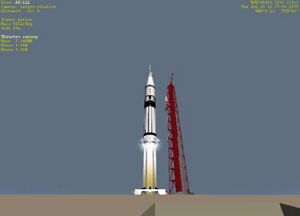
- Saturn 1b and ASTP support.
- Rewritten to use Orbiter docking support.
NASSP 3.0 still runs under Orbiter 2006, with no modifications required.
NASSP 4.x
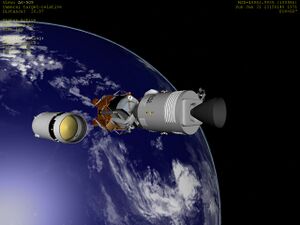
- Control Panel for both Saturn V and Saturn 1b.
- LM Panel available.
- Engine Gimbal control for all rocket stages, Service module and LM.
- Totally rewritten Autopilot (a semi auto mode is available for engine control only).
- New Saturn V and Saturn 1b meshes.
- Optional high-res Saturn V and Saturn 1b meshes.
- Docking system enhancement etc...
NASSP 5.x
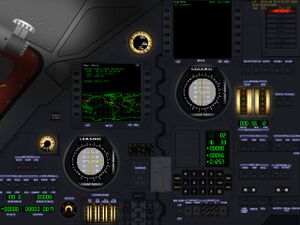
- New CSM and LEM meshes. Only high-res meshes supported for the Saturn 1b and Saturn V.
- New control panels with illumination support from P64.
- Skylab.
- Exhaust particle streams.
- New exhaust textures.
- C++ AGC implementation for launch and TLI.
- Rewritten in C++, to eliminate bugs and crashes due to global variable use.
- Revised launch autopilot for increased accuracy.
- Same functionality level for Saturn V and Saturn 1b.
- NASSP-specific solar system configuration.
NASSP 5.x does not currently run under Orbiter 2006 as its Solar System files are incompatible with the new Orbiter format. It could probably be made to run with some changes to the config files.
As an extension to NASSP Rodion M. Herrera and others did the NEP (NASSP Enhancement Pack), which contains lunar landing scenaries and mission specific astronauts etc. A modified NEP version is still available for Project Apollo - NASSP 6.4.3.
Also there was an experimental Virtual AGC integration add-on called Virtual Apollo based on Mark Grant's NASSP_COSTAM v2. Meanwhile it's obsolete and replaced by the Virtual AGC mode in Project Apollo - NASSP. The documention is still online.
NCPP 1.0
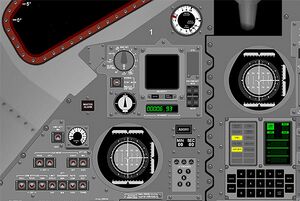
NCPP (NASSP Complete Panel Project) was done by Matthias and Fabian Müller based on NASSP 5.2 and was the first version with realistic panels. Compared to the panels in the 7.0 beta, which are done by Matthias and Fabian Müller, too, it was only a beginning, of course. The home of NCPP was NASA-virtual.com.
- New CSM and LM control panel
Project Apollo - NASSP 6.x
At the beginning of 2005 Jean-Luc Rocca-Serra wasn't able to further develop NASSP and the add-on began to scatter a little bit. Additionally to NASSP 5.2 and NEP 1.0 meanwhile there was NCPP 1.0 and later on NASSP 6.1, which was an enhancement/fix of NCPP 1.0 for Orbiter 2005. Because all these add-ons depended on each other, at the worst time the user needed to install 7 or 8 files from 3 sites in a certain order. It was so weired that Dan Stephan wrote a quite adequate article about that on his site: "Houston, this add-on has a problem"...
At that point some people (like Mark Grant, Matthias Müller etc.) decided to move NASSP to SourceForge as an GNU GPL licensed open source project to save NASSP from vanishing completely and to make team development possible. At that point we wanted to rename the add-on to the more intuitive name "Project Apollo", but this project name wasn't available at SourceForge so we made a compromise and took NASSP as project "unix name" (SourceForge term for the unique project name used for URLs etc.) and "Project Apollo - NASSP" as project title and bundled all these components together for the 6.3 release.
- Rebuilt for 2005 Orbiter release.
- Basic virtual cockpit view.
- Initial support for unmanned Saturn test flights.
- More SIVB payloads.
- Basic LM ascent autopilot.
- Improved AGC emulation.
- Improved Saturn 1b autopilot.
- More realistic Command Module aerodynamics.
Project Apollo - NASSP 7.0
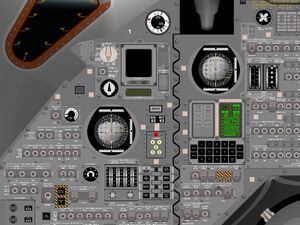
- Fully functional 2D Panel Support throughout the CM.
- 3D Virtual Cockpit (nonfunctional at the moment).
- Realistic simulation of most major spacecraft systems.
- Historically accurate checklists.
- New CM, SM, and KSC meshes (VAB, LUT, LC34/37/39, MSS, MLP, Crawler etc.).
- Integrated Virtual AGC.
- Integrated Launch Vehicle Digital Computer for the Saturn rockets.
- Full launch and landing autopilot for the LM, and enhanced autopilot for the Saturns and CSM.
- Meshland integration.
- Engineering camera views during launch.
- Realism settings to accommodate orbinauts from 9 to 92!
- Support for low-res Saturn 1b and Saturn V meshes as well as high-res.
- Partial Apollo 5 (unmanned LM test) support.
- Service Module breaks up on re-entry, based on re-entry heating.
- Apollo 13 oxygen venting simulation.
...and MORE!